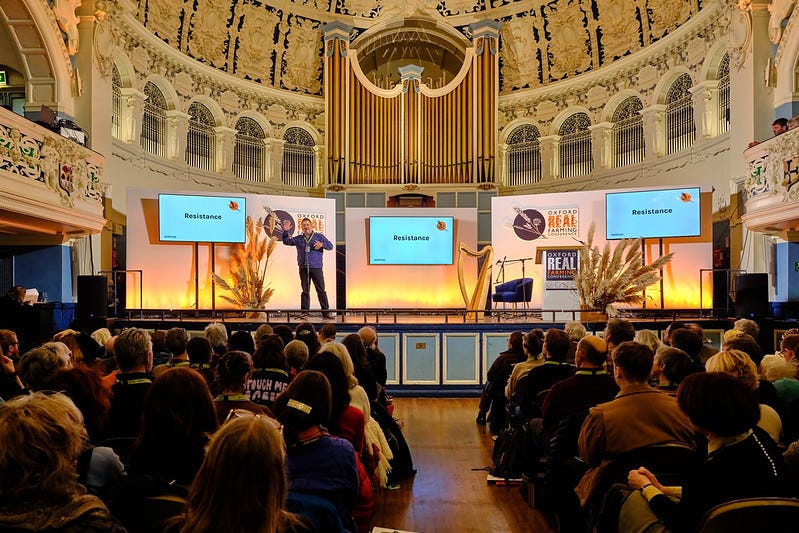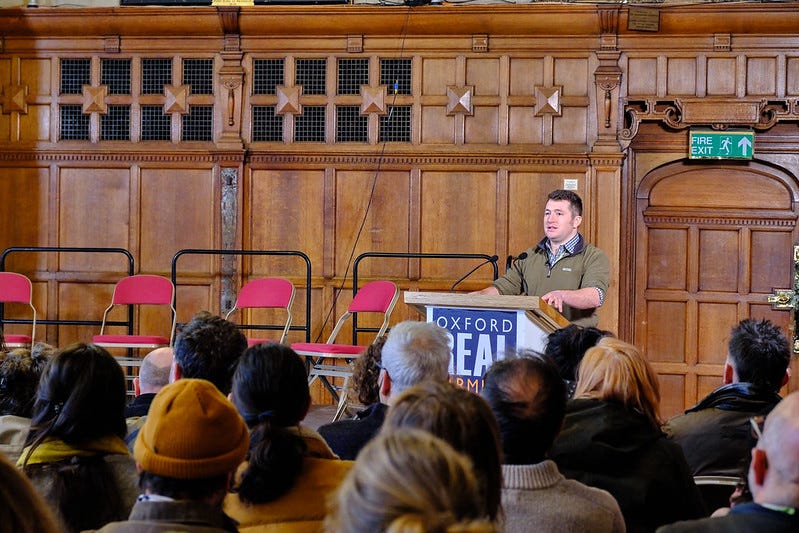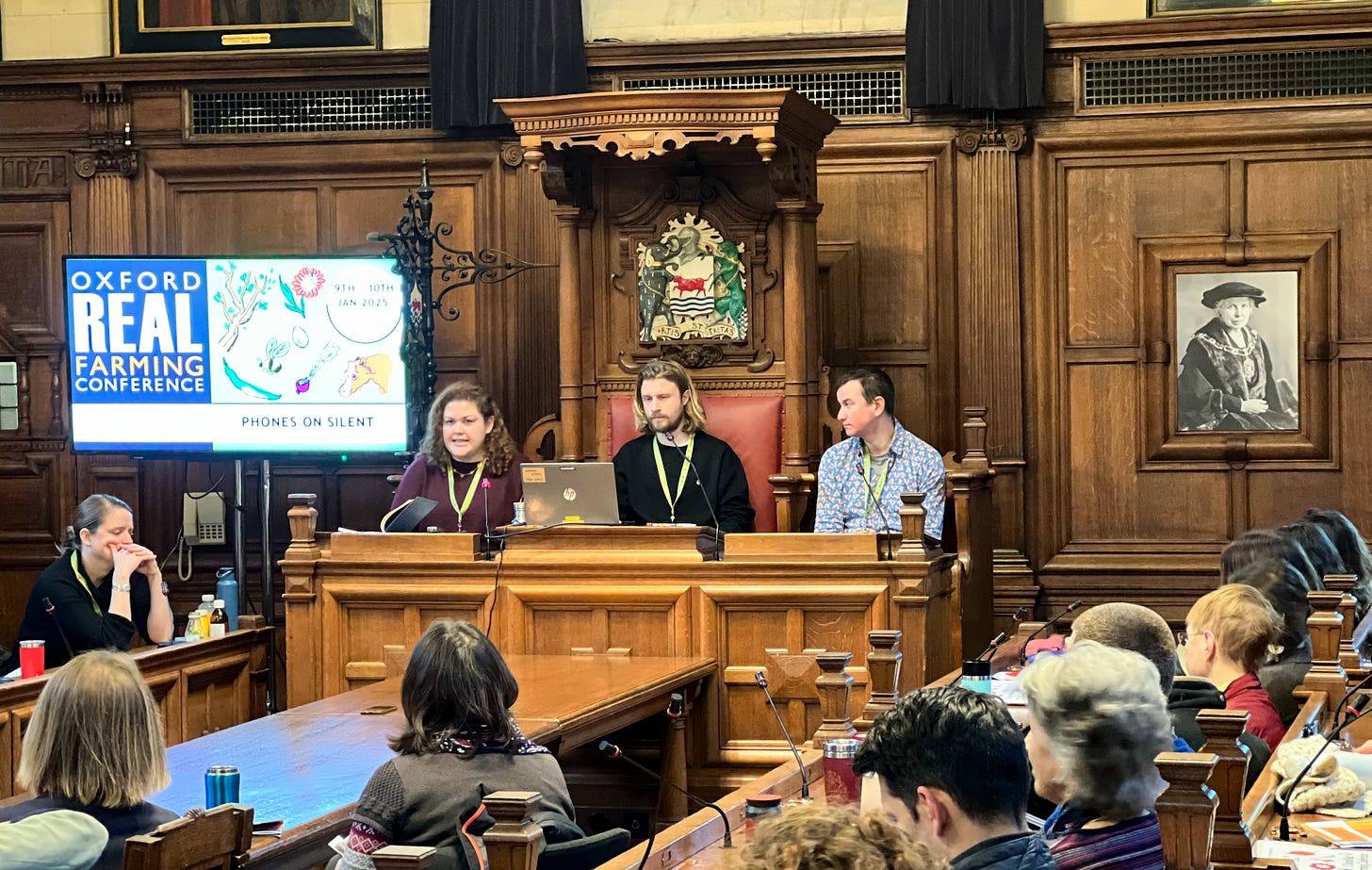This year marked my first time attending the Oxford Real Farming Conference (ORFC), and to say it was inspiring would be an understatement. Over two days, I was immersed in sessions exploring agroecology, food systems, livestock integration, conservation, and the challenges we face as farmers. ORFC was more than a conference—it was a celebration of solutions rooted in farming reality, not just theory.
Meanwhile, just down the road, Steve Reed, Secretary of State for DEFRA, spoke at the Oxford Farming Conference (OFC), unveiling a “new deal” for farmers. While Reed’s speech touched on many challenges farmers face, it felt disconnected from the tangible, grassroots solutions being discussed at ORFC. As a high-welfare, small-scale farmer fighting to keep my farm alive, the contrast couldn’t have been more striking.
ORFC: Celebrating Community-Driven Solutions
ORFC was a testament to the ingenuity and resilience of farmers. The opening plenary set the tone, with James Rebanks delivering a particularly moving speech. He spoke about leaving his 17-year-old daughter in charge of their farm while attending the conference, emphasizing the very real threats to farming today and the need to inspire the next generation to keep going. His words hit home for me as someone who feels that same urgency to protect not just the land but the future of farming itself.
The sessions throughout the conference were packed with ideas, but a few stood out as truly transformative.
Low-Cost Interventions: Benefits for Animals, Environment, and Farmers
One of the standout sessions was "Low-Cost Interventions to Benefit Animals, Environment, and Farmers," which showcased practical ways to improve farming systems without overwhelming costs. A perfect example was The Wooly Pig Co., an agroforestry pig venture integrating pigs into woodland systems. By allowing the pigs to forage naturally, they clear overgrown areas, aerate the soil, and enrich it with their manure—all while reducing feed costs.
This resonated with me deeply because it aligns so closely with how we manage our pigs. It’s a reminder that when we allow animals to behave naturally, we can create systems that benefit both the land and our bottom line. The simplicity of this solution was a breath of fresh air amidst the often complex challenges of farming.
Sustainable Meat: The Abattoir Crisis
The crisis surrounding small abattoirs in the UK was another key theme at ORFC. In the early 1900s, there were 30,000 abattoirs; today, there are just 122. Many of these won’t accept horned cattle or rare breeds, forcing farmers to travel long distances at great cost and stress to the animals. The decline in small abattoirs also threatens the survival of rare breeds, as fewer farmers are willing to take on the added complications.
I learned about innovative solutions, such as on-farm slaughter units like the one at Fir Farm. In the EU, rules adopted in 2021 allow animals shot in the field to enter the food chain if they reach an abattoir or butcher within an hour of bleeding out. It’s a humane, practical solution, and there’s no reason the UK couldn’t adopt it—if the political will existed.
One of the most inspiring case studies came from South Dakota, where farmers came together to open a meat processing unit after their local abattoir closed. This revived the community, creating jobs and breathing new life into the local economy. It’s a powerful reminder of what’s possible when farmers are empowered to take control of their own supply chains.
Grazing for Good: Livestock and Biodiversity
Livestock often gets scapegoated for climate change, but the truth is far more nuanced. This session, hosted by Patrick Holden, highlighted the critical role of livestock in restoring biodiversity and improving soil health.
One comment that stuck with me was that “livestock self-medicate in biodiverse systems.” Cattle grazing on multi-species pastures instinctively seek out plants like nettles after calving, naturally balancing their diet. It made me reflect on how humans have lost this connection with nature, relying instead on ultra-processed foods and pharmaceuticals to address issues nutrient-dense whole foods could prevent.
The Knepp Estate’s rewilding project provided another inspiring example. By letting longhorn cattle, Tamworth pigs, and Exmoor ponies graze in a way that mimics natural ecosystems, they’ve created a biodiverse haven while producing high-quality meat as a byproduct. It’s proof that farming and conservation aren’t at odds—they’re deeply interconnected.
Ultra-Processed Foods: A Symptom of a Broken System
One of the most thought-provoking sessions was on ultra-processed foods (UPFs). Rob Percival from the Soil Association described UPFs as a symptom of a broken food system, not the root cause. He emphasized how industrial food production prioritizes profit over health, leaving us with nutrient-deficient diets that harm both people and the planet.
The idea of labeling foods based on nutrient density rather than just ingredients struck a chord with me. Imagine if we could see the nutritional value of a carrot from an industrial farm versus one from a regenerative farm. It could revolutionize the way we shop and eat, steering us back toward whole, nutrient-dense foods.
Steve Reed’s Speech: A Disconnect for Small-Scale Farmers
In contrast to ORFC’s grounded, practical solutions, Steve Reed’s speech at OFC felt out of touch. While he acknowledged many of the struggles farmers face, his solutions—like AI-driven pest management and precision breeding—felt more aligned with factory farming than the small, regenerative farms that are essential to our future.
I don’t use AI (artificial insemination) on my farm. I let my animals breed naturally, because I believe in high-welfare, regenerative systems. My fear is that these technologies are designed to prop up industrial agriculture, not support small-scale family farms.
Reed’s emphasis on diversification as a necessity also struck a nerve. While diversification works for some, farmers shouldn’t have to rely on secondary income streams just to survive. Our primary role is to grow food, and we should be able to make a profit from that alone. Yet endless red tape around planning permissions makes diversification increasingly difficult, especially for small farms.
Where Do We Go From Here?
ORFC left me inspired but also painfully aware of the challenges ahead. If we continue on our current path, we risk losing not just small farms but entire communities and ecosystems. Farmers like James Rebanks’ daughter—passionate, skilled, and ready to carry the torch—need a system that supports them, not one that constantly puts obstacles in their way.
Steve Reed ended his speech by saying, “Change is coming. It won’t always be easy, but it brings real opportunity.” At ORFC, I saw what that opportunity could look like: a food system rooted in agroecology, fairness, and community. But for that vision to become reality, we need more than words. We need action—action that prioritizes farmers as essential players in our food security and economy.
These two days reignited my passion for farming, a flame that has been dimmed by the stress of our court battle and the uncertainty of our future. ORFC reminded me that, no matter what happens with our planning outcome, I will always have a role in farming—whether as a farmer, consultant, reporter, or activist. Farming isn’t just my livelihood; it’s my identity. And I’ll continue to fight for it, no matter where the journey takes me.









Great to hear about those talks I didn't get to listen to! Thanks Helen
A great round up, and I'm only *so* annoyed that I forgot to arrange to meet up with you! We were in the same room! Never mind, maybe next year?